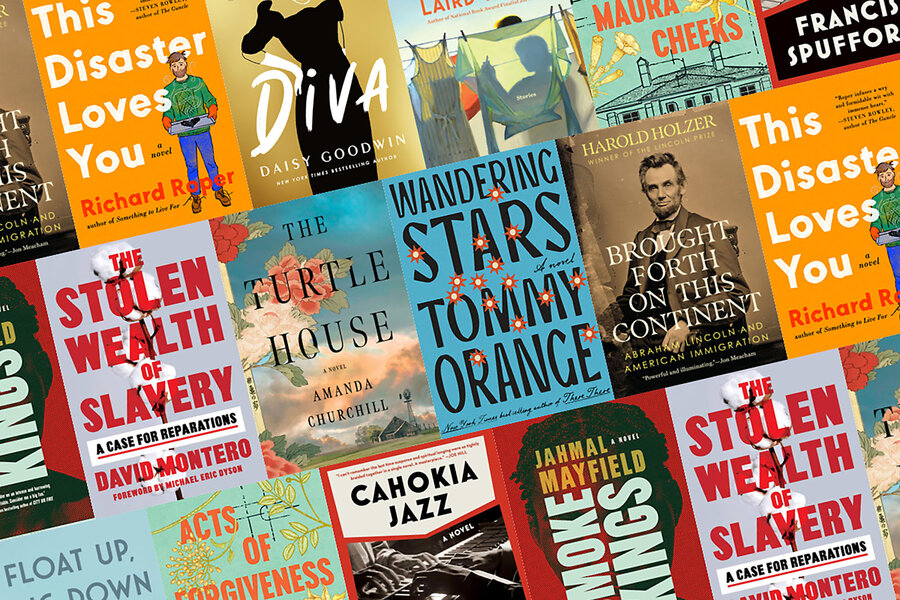The 10 best books of February reckon with the past – and present
Loading...
As Black History Month in the United States draws to a close, several of our picks for the 10 best books reflect a reckoning with the history of slavery. As James Baldwin wrote in 1963, “Not everything that is faced can be changed, but nothing can be changed until it is faced.”
The idea of reparations for families of enslaved people unfolds both in the fictional tale “Acts of Forgiveness” and in the nonfiction history “The Stolen Wealth of Slavery.” The first depicts the hurdles Black people face to find proof of their ancestry. The second examines how banks and other institutions in the North benefited from slavery more than plantations in the South did.
Why We Wrote This
Literature can change minds. It can also help us imagine a different future. From redressing old wrongs to taking new steps, the protagonists in our 10 picks for this month seek justice and autonomy.
The crime novel “Smoke Kings” imagines a kind of present-day vigilante justice, in which four friends track down living descendants of white enslavers to make them pay reparations.
The remaining novels highlight strengthening family bonds, kindling confidence, and finding one’s voice after a devastating loss.
Float Up, Sing Down, by Laird Hunt
In Laird Hunt’s collection of stories, residents of an Indiana farming community in 1982 go about their routines, with secrets and regrets roiling beneath the surface. “Things grew where they grew and flew where they flew and that was all there was to it,” thinks one character. It’s an assessment that infuses these deeply felt tales.
Wandering Stars, by Tommy Orange
Why We Wrote This
Literature can change minds. It can also help us imagine a different future. From redressing old wrongs to taking new steps, the protagonists in our 10 picks for this month seek justice and autonomy.
Tommy Orange weaves a fictional Cheyenne family into such real-life events as the Sand Creek Massacre of 1864, dramatizing the impact of historical events on subsequent generations of Native Americans. “Wandering Stars” is the engaging follow-up to his award-winning first novel, “There There.”
Cahokia Jazz, by Francis Spufford
Welcome to Cahokia, Illinois, in 1922, a fast-paced industrial burg whose Black, Native, and white denizens dwell in relative calm. After a gruesome murder ignites old fears, Joe Barrow – a biracial police officer with a talent for jazz piano – gets the case. Oozing with noir tropes yet still remarkably original, Francis Spufford’s speculative tale wrestles with trust, truth, and transformation.
Acts of Forgiveness, by Maura Cheeks
The novel imagines what the United States would look like if the government passed a law requiring reparations to descendants of enslaved people. As Black families pour into the South to hunt for records of their ancestors, the white backlash begins. The novel begins slowly, but builds with each page.
Smoke Kings, by Jahmal Mayfield
If first novels indicate career trajectory, Jahmal Mayfield has a future in crime fiction. His “Smoke Kings” is a fresh take on current events and history, mixed with social commentary. It’s a fast-paced story of twisted altruism that is not only entertaining but also thought-provoking.
Diva, by Daisy Goodwin
Novelist Daisy Goodwin unfolds the glamorous world of legendary opera star Maria Callas, and her love affair with Greek tycoon Aristotle Onassis. Heartbroken after Onassis marries the widowed Jacqueline Kennedy, Callas discovers her true voice.
The Turtle House, by Amanda Churchill
When Grandminnie unexpectedly becomes her architect granddaughter Lia’s roommate, they begin sharing poignant secrets as Lia records Grandminnie’s life stories. This exceptional debut novel honors Amanda Churchill’s real grandmother, a Japanese war bride who relocated to a vast Texas ranch in the 1950s. “The Turtle House” is filled with bighearted characters, delightful storytelling, and precise prose.
This Disaster Loves You, by Richard Roper
Sad-sack Brian, a British pub owner in midlife, has been mourning the baffling disappearance of his wife, Lily. Following the digital breadcrumbs of an online travel reviewer who may be Lily, Brian embarks on a quest to find his beloved. In Richard Roper’s capable hands, the search becomes so much more – a kindling of confidence, a step down new paths. It’s an engaging, poignant read.
The Stolen Wealth of Slavery, by David Montero
Journalist David Montero’s searing, meticulous history demonstrates that the banks and corporations of the North, more than the plantations of the South, benefited financially from slavery in the U.S. Many of those entities are still in business today. In following the massive wealth created by enslaved people in earlier centuries into our own, the author makes a compelling argument for reparations.
Brought Forth on This Continent, by Harold Holzer
Harold Holzer covers the previously neglected topic of Abraham Lincoln and immigration in his illuminating book. He begins with Lincoln’s balancing act as a member of the nativist Whig Party early in his political career. The author then charts the 16th president’s embrace of European immigration as the standard-bearer of the new, anti-slavery Republican Party.







